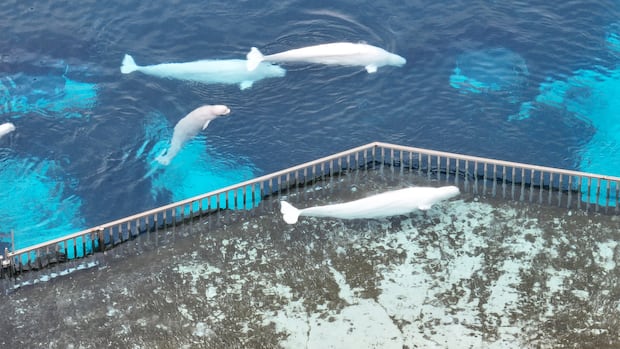Chidi Nwagbo says he made a “stupid” decision paying human smugglers to get him into Canada that left him permanently scarred and in the hands of the very U.S. immigration authorities he was trying to flee.
The 57-year-old says he paid $2,000 US in cash to a human smuggling organization in New Jersey to escape the immigration raids sweeping the U.S. He says the smugglers lied to him about the dangers of the journey that almost killed him along the borderlands between New York State and Quebec in February of this year.
“If I had known that this would have been the outcome, I don’t think I would have done it,” said Nwagbo in a phone interview with CBC News from the U.S. Immigration and Customs Enforcement (ICE) detention centre in Batavia, N.Y.
The Canada-US Border Rights Clinic, an organization that provides legal advice to migrants, is working on his case but he’s facing imminent deportation to Nigeria — a country he left 37 years ago.
He’s now warning others not to follow in his footsteps.
The choice to leave the U.S.
Nwagbo, moved to the U.S. from Nigeria in the late 1980s, where he built a life. He has five U.S.-born children from two marriages.
He received a bravery award in 2014 from the Columbus, Ohio, fire department after saving a 10-year-old girl from drowning. Yet, he failed to get U.S. citizenship and faced a removal order in 2021 after missing an appearance at an immigration hearing, which his lawyer blamed on a “scheduling error,” according to records.
Nwagbo said he felt he had no choice but to flee to Canada after U.S. President Donald Trump’s election victory last November. A friend gave him a phone number linked to a WhatsApp account run by human smugglers from New Jersey.
He flew from Atlanta, Ga., to Newark, N.J., early on Feb. 1, then took an Uber to a McDonald’s in Paterson, N.J., where the smugglers told him he’d be picked up.
Nwagbo, carrying $2,000 US cash stuffed in his pocket, says he waited for several hours.
“I was afraid. I got nervous,” he said. “I thought, ‘What if they were police or ICE or something?'”
Finally, he received a text telling him to step outside where a pickup truck waited. He was taken to a Dunkin Donuts and transferred to the very back seat of an SUV with Florida plates. They headed toward the Canadian border in the early afternoon. He says the journey took about seven hours.
About 15 minutes before the drop-off point somewhere along a rural road near the New York State border with Quebec, Nwagbo says the smugglers told the group to prepare to exit the vehicle and run into the bush. He was told to download a compass app on his phone and keep the arrow pointing north.
They were assured someone would be waiting to pick them up on the other side.
“As soon as I took a few steps, I knew I made a mistake,” he said.
Front Burner27:41What exactly is ICE?
The frozen path to Canada
Nwagbo recalls thinking he was going to freeze to death as he trudged through deep snow in the forest for hours under a waxing crescent moon on that cold February night.
A woman from Guinea who walked with him kept losing her shoes in the snow until finally, she left them and continued in her socks. Two women from Haiti struggled behind them, one carrying an 11-month-old boy.
As Nwagbo pushed his way through snow and brush, he lost his gloves and all feeling in his fingers, making it difficult to answer calls from the smugglers trying to direct their movements.
“These people will call me and say, ‘Just keep going, you only have 10 minutes,’ ” he said. “It was supposed to be a 30-, 40-minute walk.”
Exhausted and numb from temperatures that dipped to -28 C overnight, they called 911 for help. Nwagbo wasn’t sure where he was along the border, and feared apprehension by U.S. Border Patrol agents.
“When I found out that it was Canadian [police], then it was a big relief,” he said.
There has been a significant change in the number of asylum claims since U.S. President Donald Trump took office, specifically at the regular border crossing in Lacolle, Que., according to Canada Border Services Agency (CBSA) data obtained by Radio-Canada and CBC News. The data shows there had already been 557 asylum claims at Lacolle in the first six days of April — just three fewer than in all of January.
The price of the journey
The journey exacted a price on Nwagbo’s body. Frostbite forced the amputation of his pinky, ring and middle finger along with the top of his thumb on his left hand. He lost the top of his middle and ring fingers on his right hand.
Quebec RCMP said officers received a call in the evening of Feb. 1 that a woman and her children were lost in a forested border area roughly 30 kilometres south of Salaberry-de-Valleyfiel, Que.
The RCMP told CBC News that officers found a group of three women, one man and a child who were “illegally crossing from the U.S. to Canada.”
The group was taken to hospital and treated for “various frostbites,” according to the RCMP. They were then transferred into the custody of Canada Border Services Agency (CBSA) at the Saint-Bernard-de-Lacolle port of entry, about 64 kilometres south of Montreal.
Nwagbo was one of 99 people intercepted by the RCMP in February crossing irregularly over the Quebec-U.S. border, according to data from Immigration, Refugees and Citizenship Canada (IRCC).
The latest data says RCMP intercepted 329 people crossing into Quebec from the U.S. between January to April. That number is trending slightly higher over 2024 levels.
‘They might eliminate him’
Nwagbo said he chose to use human smugglers because he wrongly believed he needed to go through U.S. customs to reach a Canadian port of entry.
“I didn’t have all the information that I needed to make the right decision,” he said.
Nwagbo made an asylum claim at the Saint-Bernard-de-Lacolle port of entry, saying he had a brother who was a Canadian citizen. This is one of the exemptions under the Safe Third Country Agreement (STCA) between the U.S. and Canada.
Under the agreement, refugee claims must be submitted in the country where people first arrive. For this reason, Canada turns away most asylum seekers who attempt to enter from the U.S. at land-border crossings, but there are exceptions to this rule.
His asylum claim was rejected after a CBSA officer determined he couldn’t prove the relationship with his older brother Jolly Nwagbo, 74.
“He had no copy of his birth certificate to confirm the relation,” read the CBSA determination obtained by CBC News.
The CBSA officer wrote they could not reach Nwagbo’s brother by phone despite three attempts. Nwagbo was transferred into U.S. custody at the Champlain, N.Y., port of entry later that day, according to records.
Jolly Nwagbo, who lives in St. Catharines, Ont., says he never received a call from CBSA.
“The situation right now is deplorable,” he said.
The writer and academic says his family faces danger in Nigeria as a result of his book, Nigeria for Sale, about corruption in the country. Jolly says his brother could be killed if he’s deported to Nigeria.
“They might eliminate him because he’s my brother,” he said, noting that other family members are in hiding.
The family is also part of the Igbo tribe that has historically faced persecution in Nigeria.
Gauri Sreenivasan, co-executive director for the Canadian Council for Refugees, says they’ve received reports that CBSA has been taking a harder line on asylum claims made under exceptions to the Safe Third County Agreement.
“We have seen a major shift in how the border rules are being enforced, with serious consequences,” said Sreenivasan.
Between Jan. 1 and July 7, CBSA has ordered the removal of 620 people who crossed irregularly between ports of entry and were found ineligible under the STCA, according to the latest CBSA data. The agency ordered the removal of 645 people between Jan. 1 and July 31 under the same circumstances in 2024.

Nwagbo, who is still awaiting word about when he will be deported, says he regrets his decision to use smugglers to come to Canada and is now warning others.
“Don’t do it. It’s risky.”
He says smugglers “only care about money. They don’t care about your safety.”








